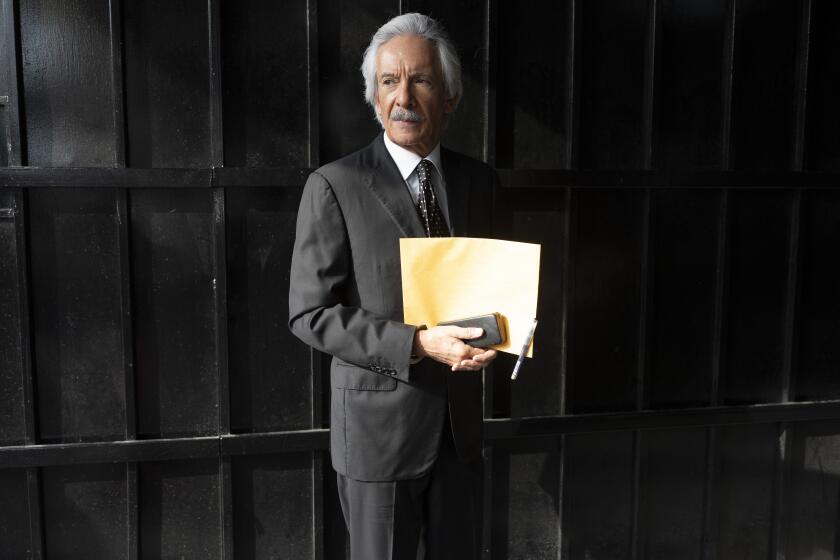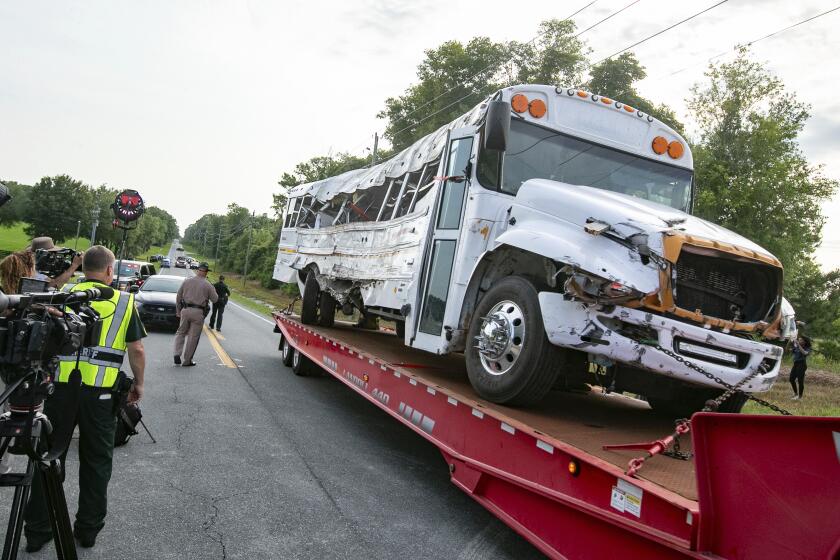A Decade After Unification, Yemenis in South Resent North’s ‘Occupation’
The battered white Toyota bumped slowly down the alley. The driver leaned out the window searching each face for something safe and familiar.
He hit the brakes after spotting a family friend, a lean old man with skin like coffee and teeth of gold.
The two spoke discreetly before ducking into a stairwell and shouting up the steps. “Who are you?” a voice called down nervously. “It’s OK,” they said. “We are from the south.”
“Come,” the voice said.
At the top of the stairs, spread out on a red flowered carpet, was Badr Basunaid, one of Yemen’s most outspoken government critics and a leading defender of the concept of two Yemens.
“This is an occupation,” he says of the northern government that has controlled the south, including Aden, since the nation unified in 1990.
Basunaid’s sentiments are common in Aden. Many southerners feel superior to but victimized by their northern cousins, who outnumber them about 7 to 1. Since unification, they claim, the government has given the best jobs to northerners, nursed Muslim militants, installed a dictatorship that masks itself as a fledgling democracy and fooled the United States at the same time.
Southerners often deride those from the north as tribal bumpkins with a weakness for guns and the narcotic khat leaf. Northerners have flooded into the once-cosmopolitan British colony of Aden. They occupy the highest positions in the army as well as the government and presidency. This grates on southerners, who see themselves as urbane, sophisticated and moderate in all things religious.
After more than a century of British colonial rule, the south gained independence in 1967 and three years later formed the People’s Democratic Republic of Yemen, the Arab world’s only Marxist state. Northern and southern Yemen fought a number of border skirmishes, the most brutal in 1979, in which 10,000 people died. The Americans supplied the anti-Communist north while the Soviets armed the south. The two sides negotiated a unification agreement and, in 1990, became one nation.
Four years later, the unhappy southerners rebelled and were crushed by a northern army that used Islamic militants who had returned from the war against the Soviets in Afghanistan.
One of the first things the culturally conservative northern troops did was torch the Seera Beer factory near Aden’s fish market. The Adenese never forgave them.
“These people are not civilized. They chew khat all day and carry guns,” hissed Amr Hassan, a southern taxi driver, as he sped past a group of about 20 bleary-eyed northerners lounging on the steps of a mosque. “Do you see southerners carry guns or wear the jambiya [ceremonial dagger]?”
Southerners say they aren’t happy about the terrorist bomb that nearly sank the U.S. guided missile destroyer Cole in the Port of Aden and killed 17 Americans. Even though it is not clear who carried out the bombing, southerners use it to illustrate the gap between their two sides.
The investigation into the blast continued Monday as the U.S. Navy prepared for the arrival of the Blue Marlin, a massive Norwegian ship that will transport the Cole back to the U.S.
Investigators have found up to six sites around Aden with evidence they hope will help them discover who was behind the blast that blew a 40-by-40-foot hole in the side of the destroyer.
A senior U.S. government official, who asked not to be identified because of the sensitive nature of the investigation, said there still are no concrete leads but that the attack did not bear the hallmarks of traditional Yemeni militants. They tend to use simpler, less lethal bombs than the device that crippled the ship, the official said.
“We are still confident we will close this case,” the official added. “We are certainly not at any dead ends.”
Basunaid says southern Yemen was a “civilized” country until 1990.
“We had the best education system, the best ships, the best schools,” he said. “Now all this has been destroyed.”
The government tries to forbid journalists from speaking with Basunaid. A high-level security official referred to him as a “madman.” The only way to reach him is to evade Interior Ministry “minders” who are assigned to every foreign journalist working here.
Northerners, who number 15 million compared with the 2 million southerners, refer to recalcitrant southerners as “decadent” and “separatists.”
“Yemen is united. We are one,” said Abdullah Saleh, a spice merchant in Aden’s Crater District who comes from the north. “We are all brothers. We are all one Islam.”
Another northerner in the neighborhood, who gave his first name as Amr, said that for years, brother fought brother in Yemen’s wars and border disputes.
Southerners take a dim view of President Ali Abdullah Saleh, a northerner. Even though the nation has elections and a parliament that includes two female representatives, they sneer at Saleh’s claims to be moving Yemen toward democracy.
“Who is ruling us?” asked Yassin Ahmed Saleh of the Yemeni Socialist Party. “A primitive tribal party. They have all the money and all the power. Elections are a farce.”
More to Read
Start your day right
Sign up for Essential California for news, features and recommendations from the L.A. Times and beyond in your inbox six days a week.
You may occasionally receive promotional content from the Los Angeles Times.






